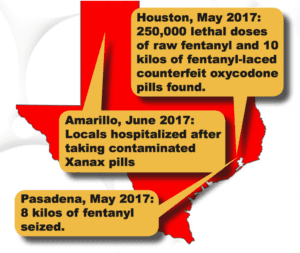Football Player In Texas Killed By Counterfeit Pills Made With Carfentanil
KPRC 2 in Houston reported on the tragic death of a 21-year-old Rice University football player on March 2, 2018 from the toxic effects of carfentanil caused by two counterfeit hydrocodone pills. Carfentanil is an analogue of fentanyl and is 10,000 times more potent than morphine and 100 times more potent than fentanyl, according to the U.S. Drug Enforcement Administration. According to KPRC 2, teammates became worried when Blain Padgett did not show up for practice that day and found the young man dead in his apartment. Police allege that Padgett purchased several of the fake pills from Stuart Mouchantaf, a former Rice Owl football player himself. After learning of Padgett’s death, Mouchantaf allegedly fled the country, only to return to return at a later date. Mouchantaf was arrested by police on October 4, 2018, reports KPRC 2.
As reported by The Houston Chronicle, the Harris County Institute of Medical Sciences tested three hydrocodone pills found in Padgett’s apartment and they all tested positive for carfentanil. Two of the pills each contained 0.933 grams and the third containing 0.477 grams. Assistant District Attorney Paul Fortenberry, chief of the Major Narcotics Division issued this stark warning to the public: “Buyers need to understand that when they buy these pills on the streets instead of pharmacies, they are literally playing Russian Roulette. These pills look like the real deal, but they in fact contain far more dangerous than even cocaine or heroin and are far less expensive.”
In a press release, District Attorney Kim Ogg said, “Users better beware that even a spec of this drug can kill you.” A lethal dose of carfentanil is so small that the human eye cannot see it. Texas is just one of the 45 states in the United States in which PSM has documented counterfeit pills made with fentanyl and its many analogues. You can read about other counterfeit drug incidents in PSM’s 2018 Texas Infosheet.
